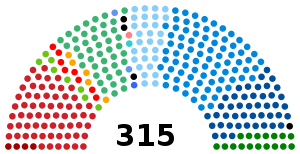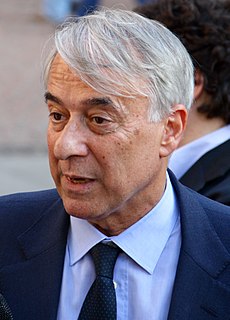| |||||||||||||||||||||||||
All 630 seats in the Italian Chamber of Deputies 315 seats in the Italian Senate | |||||||||||||||||||||||||
|---|---|---|---|---|---|---|---|---|---|---|---|---|---|---|---|---|---|---|---|---|---|---|---|---|---|
| Turnout | 81.4% | ||||||||||||||||||||||||
| |||||||||||||||||||||||||
 Election results maps for the Chamber of Deputies (on the left) and for the Senate (on the right). On the left, the color identifies the coalition which received the most votes in each province. On the right, the color identifies the coalition which won the most seats in respect to each Region. Blue denotes the Centre-right coalition, Red the Centre-left coalition and Gray regional parties. | |||||||||||||||||||||||||
| |||||||||||||||||||||||||
A national general election was held in Italy on 13 May 2001 to elect members of the Chamber of Deputies and the Senate of the Republic. The 14th Parliament of the Italian republic was chosen.

Italy, officially the Italian Republic, is a country in Southern Europe. Located in the middle of the Mediterranean Sea, Italy shares open land borders with France, Switzerland, Austria, Slovenia and the enclaved microstates San Marino and Vatican City. Italy covers an area of 301,340 km2 (116,350 sq mi) and has a largely temperate seasonal and Mediterranean climate. With around 61 million inhabitants, it is the fourth-most populous EU member state and the most populous country in Southern Europe.

The Italian Parliament is the national parliament of the Italian Republic. The Parliament is the representative body of Italian citizens and is the successor to the Parliament of the Kingdom of Sardinia (1848–1861) and the Parliament of the Kingdom of Italy (1861–1946). It is a bicameral legislature with 945 elected members and a small number of unelected members (parlamentari). It is composed of the Chamber of Deputies, with 630 members (deputati) elected on a national basis, and the Senate of the Republic, with 315 members (senatori) elected on a regional basis, plus a small number of senators for life, either appointed or ex officio. The two houses are independent from one another and never meet jointly except under circumstances specified by the Constitution.
Contents
- Electoral system
- General election
- Campaign
- Main coalitions and parties
- Main coalitions' leaders
- Results for the Chamber of Deputies
- Overall results
- Proportional
- First-past-the-post
- Results for the Senate of the Republic
- Leaders' races
- References
- External links
The election was won by the centre-right coalition House of Freedoms led by Silvio Berlusconi, defeating Francesco Rutelli, former Mayor of Rome, and Prime Ministerial candidate of the centre-left coalition The Olive Tree, and rising back to power after Berlusconi's first victory, in the 1994 general election.

The House of Freedoms, was a major centre-right political and electoral alliance in Italy, led by Silvio Berlusconi.

Silvio Berlusconi is an Italian media tycoon and politician who has served as Prime Minister of Italy in four governments.

Francesco Rutelli is an Italian politician and current President of European Democratic Party. He chairs Anica, National Association of Film and Audiovisual Industry, since October 2016. He also chairs the "Centro per un Futuro Sostenibile". He is co-president of the European Democratic Party, a centrist European political party, today counting approximately 20 MEPs. He has been Mayor of Rome 1994–2001, and president of the centrist party Democracy is Freedom – The Daisy 2002–2007. He was the Deputy Prime Minister and Minister of Culture and Tourism in the second cabinet of Prime Minister Romano Prodi 2006–2008. In 2008 Rutelli ran unsuccessfully for a new term as Mayor of Rome after the resignation of Walter Veltroni. Currently he also chairs Priorità Cultura ; Incontro di Civiltà.



























